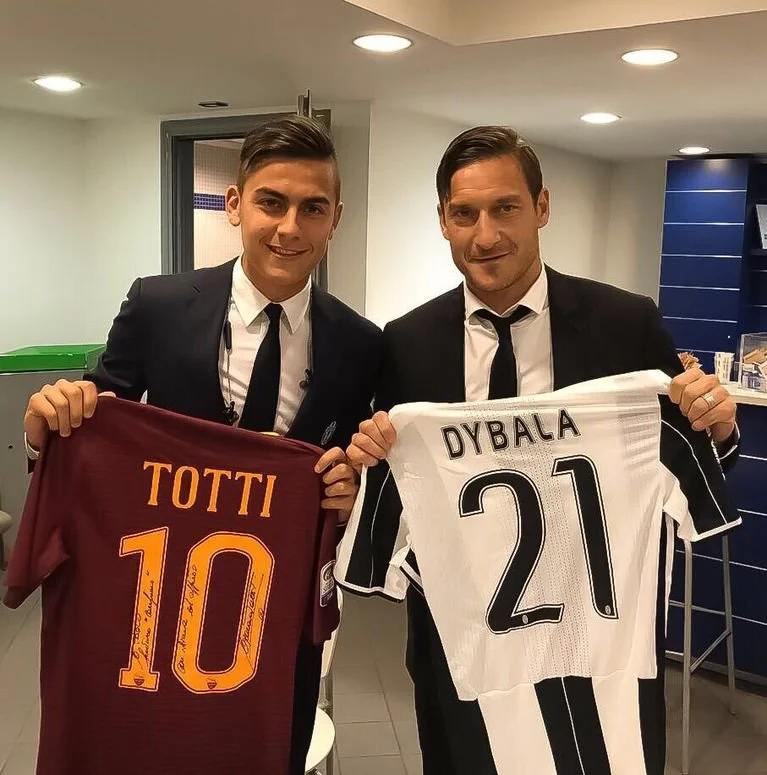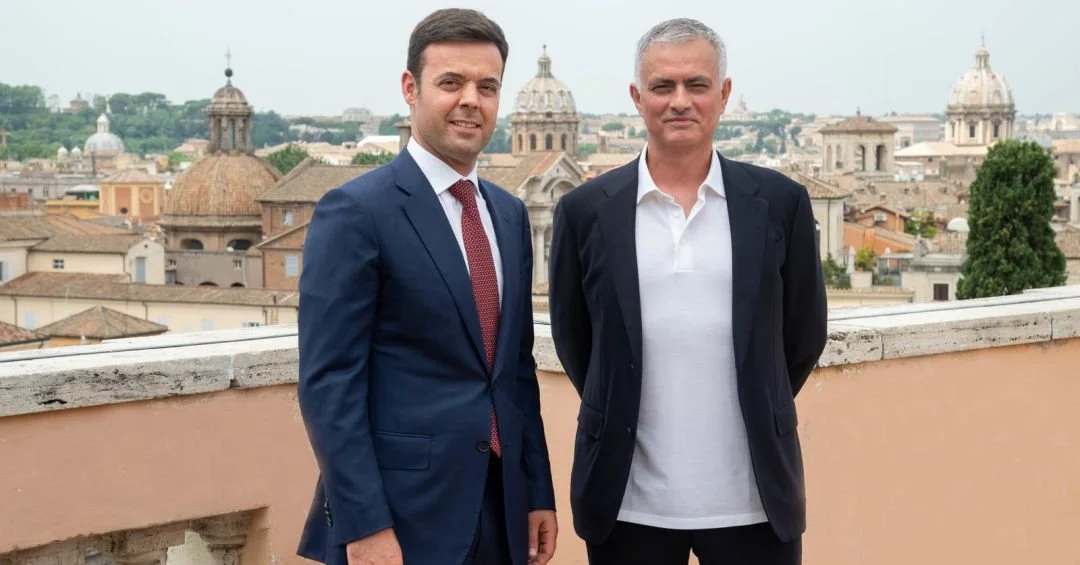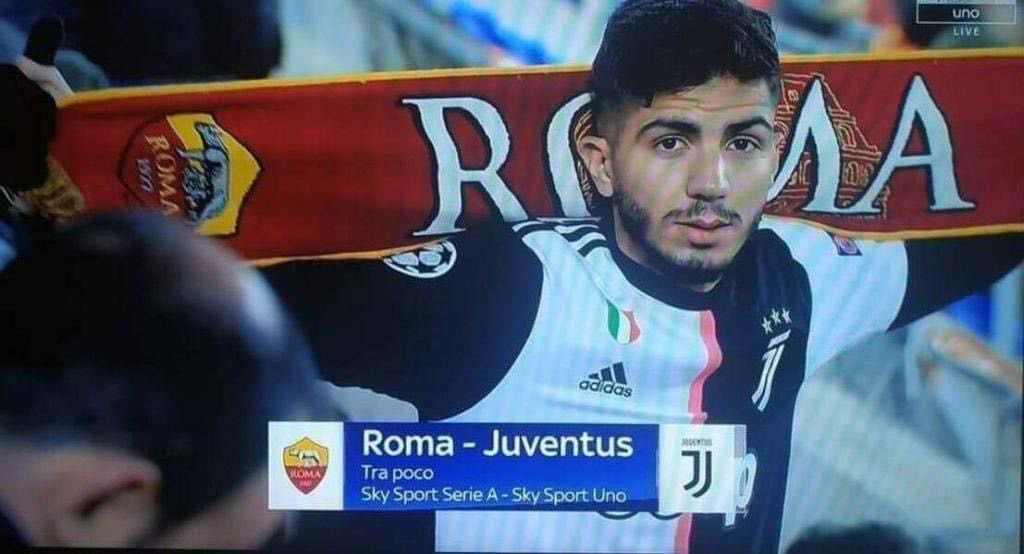Dybala to Roma Was All About Timing
Paulo Dybala (left) smiling with AS Roma General Manager Tiago Pinto (right) in Portugal.
Paulo Dybala’s move to Roma shows that even in the glamorous world of football, where careers are carefully managed by agents and player images curated by teams of publicists and brand partners, something as mundane and serendipitous as timing can affect a world-class player’s career. It was terrible timing that led to his split from Juventus and good timing that brought him to Roma’s door.
Early Monday morning, Dybala agreed to sign a new three-year contract with AS Roma worth €6 million a season (€5 million fixed plus €1 million in bonuses). He is currently in Portugal, where he will complete a medical and join the team’s training camp in the next few days. The new deal comes after significant speculation about his future following a mutual decision with Juventus not to extend his contract beyond this season.
Dybala signed his last Juve contract (the one that just expired) two days after he scored a brace in a 3-0 win against Barcelona in the Champions League quarterfinals in April 2017. The game cemented him as a top European player, the kind of talent who could turn all his ability and quality into concrete results even against the best defenders in the world. After the game, an overexcited Gigi Buffon, perhaps showing early signs of losing his fastball, said he might be one of the three best players in the world. At the time, that meant he would have to be the best player besides Lionel Messi and Cristiano Ronaldo. A hard no.
Dybala, sociable and media savvy as ever, didn’t take the bait and instead said, “I still have a lot to prove.” This sort of exaggerated claim has characterized most of Dybala’s career. In his first press conference as a Juve player, he was asked if he’d requested, or even expected, to take the number 10 jersey worn by del Piero, Baggio, and until that summer, Tevez. Instead, he pointedly answered that he’d taken the number 21. The next question, supplied with barely contained excitement at the prospect of potentially ensnaring a 21-year-old into a controversial pull quote, as if he thought he could live up to the players who had previously worn that famed Juve jersey: Pirlo (who also left that summer) and Zidane. When he said hopefully, the disappointment was palpable. It seemed as though success at Juventus was measured on a binary—you’re either a flop or Zinedine Zidane(!).
Despite all that, after seven years, 293 games, and 115 goals, he left with tears in his eyes on May 21 as the contract he signed when he was on the cusp of becoming one of the world’s best expired. He left not because of any fault of his own or lack of faith from the club. It was all simply due to bad timing.
Francesco Totti (left) and Paolo Dybala via Instagram
When he started negotiating his new contract in August 2020, just under two years before it expired, he suffered a thigh injury that would keep him out for two months. The injury caused him to miss only four games, but he didn’t make his season debut until October 20. Later, he would injure his MCL in January, ultimately missing three months of the season. That season would be the beginning of two seasons of injuries. Through no fault of his own, Dybala suddenly found himself regularly on the sidelines. There are few things less helpful to showcase your value to a team than watching them build game plans without you. Through sheer circumstance, Juve got a trial run of what it might look like without Dybala.
But Juventus never got the chance to imagine what success without Dybala could look like because the past two seasons have been disappointing by the usual standards in Turin. The club’s directors realized they needed to overhaul the roster. What better starting point than not renewing a player's contract asking for €15 million in salary (before the injuries).
Perhaps a better agent could have helped assuage all these concerns. They might have had the expertise to craft a compelling sales pitch for a player who was central to one of the most glorious runs in Italian and European football. But instead, the sea of circumstantial impediments left Dybala drifting like flotsam in the cutthroat waters of modern football. So on Monday, in another testament to the importance of timing, Dybala signed for AS Roma. If his departure from Juve was an exercise in bad timing, his signing for Roma was all about good timing.
Tiago Pinto and José Mourinho via AS Roma website
Over the past twelve months, Roma has entered a new era with a new owner—Dan Friedkin—a new general manager—Tiago Pinto— and, of course, a new manager—the beloved Jose Mourinho. The owners are dedicated to building a team capable of sustaining success. (Although it’s worth mentioning that before they do that, it would be an excellent start to have any success at all). Friedkin seems to have understood that to start to have any success at all, he needed two things: 1) competent executives and 2) world-class talent at the top end of the team.
The first seems obvious but was decidedly not the case at Roma in previous years. While the second is almost certainly a product of the first. In Pinto, Roma has an executive who has proven he can close deals with the caliber of individuals the club has never had. This is where timing comes in.
Roma couldn’t offer more money than Inter or Champions League football like Napoli. To convince Dybala, Pinto had to wait for the right moment. He had to wait for the moment when Dybala had evaluated all the other available offers, for the moment when he would be willing to lower his salary demands. But, most importantly, Pinto had to wait for the moment when he would be most receptive to what Roma ultimately had to offer—eternal glory. Suppose Juve offered a young Paulo Dybala the guarantee of winning. In that case, Roma can offer an adult Paulo Dybala the guarantee that should he win, his name will be deeply carved in yet another Italian club’s history.
A fan with mixed allegiances attends a Roma Juventus game.
It now seems abundantly clear that Roma is intent on competing for titles in a way it seldom has before in its history. The signings of Mourinho and Tammy Abraham and the genuine effort put into winning the Conference League are all signs of a team that isn’t content with the good-never-great ethos that once characterized the club.
It’s the perfect time for Dybala to join Roma because their future has never looked so bright. After all, there are few better ways to establish yourself as one of the world’s best than by winning at a club where that’s been deemed impossible. Likewise, it’s the perfect time to join Roma because it’s the place that needs him most and, therefore, the place that will love him the most.



